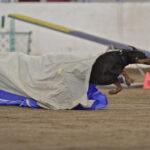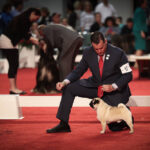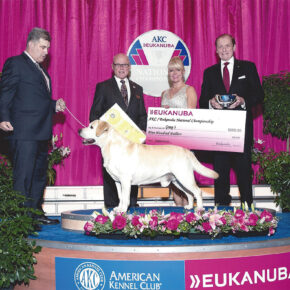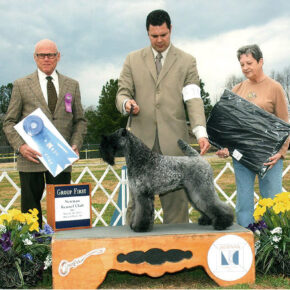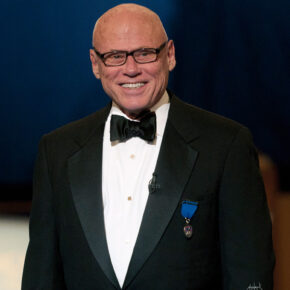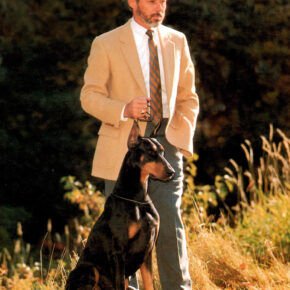EDD BIVIN
Interview with Judge
BIS Magazine USA December 2020
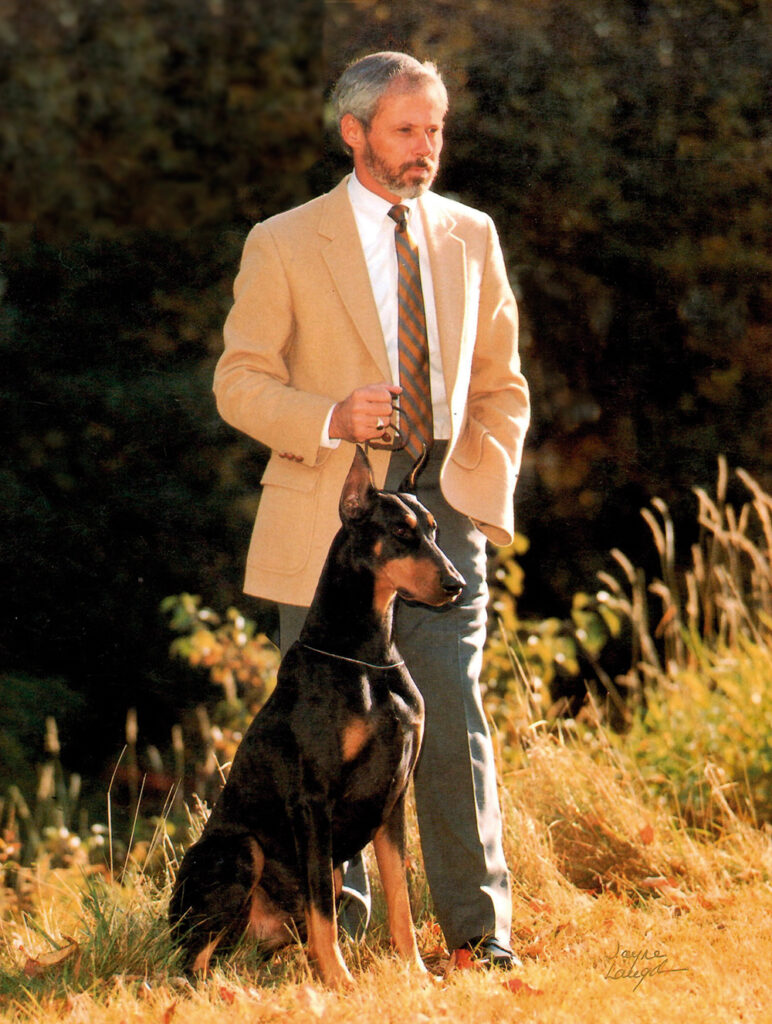
Q: We know you started in 1952, when you first acquired a Pomeranian bitch. What attracted you to a Pom?
A: I liked the coated dogs. My family had lost its elderly mixed breed pet, so at that point I started to look for another dog. I saw a Pom on the street with his mistress and asked what (breed of) dog she had. She said, ‘a Pomeranian young man’! It was cute and sassy. My family said I could get whatever breed I wanted as long as it was not a big dog. I chose this toy dog. I liked Pomeranians as they acted like big dogs, (as if) they were anything but small. They have great temperaments and are tough little dogs.
Q: How did you discover dog shows?
A: Pomeranians were not easy to find in that day. I talked to a private breeder, Maxine Bean, who I later became good friends with. She didn’t have puppies at that moment, so all she could suggest was to return to the person from whom I had acquired my first bitch pup. We had a nice conservation and kept in touch. A while later, Maxine told me there was a dog show coming up. That is when I (first) went. I remember to this day, (AKC) only had six groups. All six (were) represented so it was like Best in Show at the Garden! You know, the quality was really good! That is how I got started.
Q: How did you progress from 1 dog to 30 in a couple of years.
A: I would say it was (closer to) 6-8 years. I had a small toy kennel and had 30 dogs in the kennel. I got hit with distemper. They got hepatitis really hard. They didn’t have vaccines back then for toy dogs. It was really hard on dogs.
Q: Were you in high school when you started breeding dogs?
A: Yes, I was in high school, bred dogs and had litters. My family was very supportive. I was doing what I wanted to do. They were always behind me, helping with everything.
When I got hit with distemper I lost 16 dogs. Their support carried me through somehow.
Q: You finished high school, attended college, graduated, and went on to work at Texas Christian Univeristy for 32 years. How difficult was it to balance showing dogs with school/study/work?
A: I graduated from TC University and then taught in a public school.
During that time, I was married.. but that marriage was not successful, so we divorced.
I had only a few dogs at that time because I was also going to school and was focused on finishing school. But I never stop showing dogs. I just didn’t have that many dogs. Actually, I never showed lots of dogs (simultaneously). I was a kid and had to pay for this activity on my own. You know, going to a university was expensive so I didn’t have lots of money to go to many shows. Maxine (Bean) was very helpful and supportive. We went from time to time to dog shows. I would drive and do all that but it was easier when someone was with me. I was a young kid but people were good to me. They wanted to support me. That made a difference.
Q: Do you have any other hobbies?
A: (When I was young) I appreciated what my father insisted upon when he said, ‘As long as you live in this house, you have to do something other than dogs. You can do the dogs, but you have to do something else too’. I was involved in music but gave that up for the dogs. I gave up some other things for the dogs as well. It became somewhat (time) absorbing!
Q: What was the most successful dog you have bred/shown?
A: The best Pomeranian that I ever produced was Ch Edwards Reddy Teddy. This was while I was a kid in high school and college with little money to show dogs. He did finish handsomely. He did some nice siring too.
When Irene and I married, our best show dog was a Doberman Pinscher. The best producer we ever owned was Ch Boo Radley. He sired the grand futurity winners at the Doberman Pinscher national specialty three years in a row, out of three different bitches. He and his son Ch Eldo Radley tied for top sire of the breed one year.
Q: Did you meet your wife, Irene, at the shows?
A: Yes. I met her at the shows, and we became friends, then romantically involved. Irene had Dobermans. In 1978, we got married. We never had that many litters. If we had two litters a year, we were pushing it. Most years, we would only have one litter. We bred very carefully and worked very hard.
Q: Were you showing or judging when you first met?
A:When Irene worked at the kennel club, we couldn’t show. When we got married, she resigned from the kennel club so we could start showing some dogs. She was always showing. I didn’t show dogs. It was Irene that showed early on. As we got better, we became more competitive. Since we were judging (then), we didn’t go into the rings ourselves at all.
Q: Maxine Bean and Anne Clark are your big mentors. Can you please share what you learned from them?
A: I always said Maxine taught me a lot about function and certainly about type.
Maxine’s father, Herman Cox, taught me about Hounds and other different breeds though not with the same intensity as Annie and Maxine.
Maxine was very helpful as she taught me about care, brushing and doing all that (grooming). Maxine was so ‘hands on’ about dogs herself. Proper management was very important to her. Annie didn’t teach me so much about practical matters, rather we discussed aesthetic theory, harmony, balance, type, function and structure.
Q: What year did you start judging full time?
A: I never judged full-time. I was involved with the University until 2003. I retired early because we knew about Irene’s health and she couldn’t get well. I judged quite a bit afterwards. But I have never judged full-time.
Q: Would you say your judging is based more on type or movement?
A: I judge more type. I want sound animals but I want dogs to look like the breed.
Q: How did it feel to judge BIS at Westminster kennel Club.
A: It was, of course, the pinnacle of my dog career! I had judged groups at that time, the breed rings. All equally important as far as responsibility towards the breeders and the dogs are concerned. To be asked to do Best in Show at the Garden was a tremendous surprise! It reflected the respect I had earned and felt like a ‘stamp of approval’ for all I had tried to do in dogs for many decades.
The AKC (National Championships) Best in Show came after that. I continued my work judging groups etc. including at major events and many national specialties, which I feel are important assignments.
Westminster was a great thrill and great honor for me.
Q: You started in purebreds in the 1950’s. Over the past 60 years, how has grooming and presentation changed at the shows?
A: Certainly grooming and presentation is more extreme today in many breeds than it was back then. I really wish we were more reasonable about that. Today, we trim breeds in ways that alters typical breed appearance. All those things are unnecessary.
Q: What do you think has changed most over the last 10 years regarding entries?
A: Too many shows diluted the quality. Of course, Covid-19 is also having an affect on current months, so lets talk without it. If we have too many shows, there is seldom keen competition. People are unable to observe and to learn from and to see the top dogs. We don’t have the same display of good quality dogs competing with each other on a more frequent basis. We don’t have strong mentors.
In my opinion, to be a good judge, you must have seen good dogs. Nowadays, this means you need to travel all over the country to see them, one at a time. It is tough to learn.
Q: Do you think the quality of the dogs you judge is based on the work of the breeders?
A: The breeders must have good dogs to breed. But they have to breed good dogs for us to have good dogs. Breeds are cyclical. They tend to be strong for awhile, then they’ll go down. Then in a few years, they come back. You need a cluster of talented breeders working together and competing to bring a breed to a strong standing.
Q: How do you see shows after Covid-19? Will things change?
A: I can’t predict what will happen. I can tell you that once something has started, it is very difficult to curtail it. When you have so many dog shows every weekend, so many at one place, that is the convenience factor which has become the expectation. Changes in the show calendar will require a collective understanding of which direction our sport needs to take.
Do we want the title ‘Champion’ to increase in significance or diminish?


